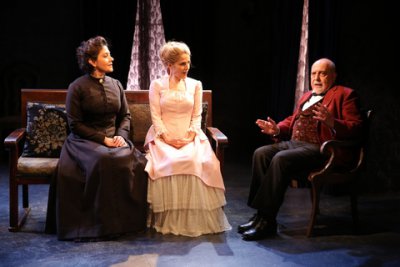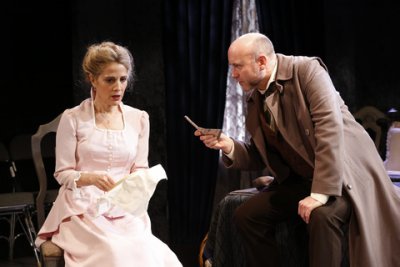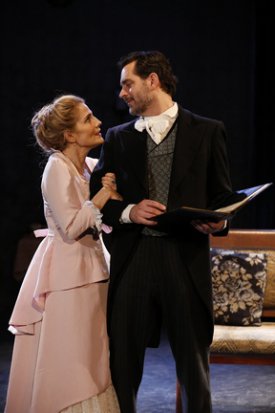Nora
Ingmar Bergman’s streamlined adaptation of Ibsen’s “A Doll’s House” receives its Off Broadway English language premiere piloted by Austin Pendleton.
[avatar user=”Victor Gluck” size=”96″ align=”left” ] Victor Gluck, Editor-in-Chief[/avatar] In 1981, as his farewell to the Munich theater, director Ingmar Bergman adapted three Swedish classics for stage in his own versions: Ibsen’s A Doll’s House retitled Nora, Strindberg’s Miss Julie, and his own Scenes from a Marriage. Last year New York Theater Workshop presented the New York stage premiere of Scenes from a Marriage. Now La Femme Theatre Productions is presenting the Off Broadway premiere of Nora in the translation by Frederick H. Marker and Lisa Lone-Marker under the direction of Austin Pendleton.
Bergman’s adaptation streamlines the Ibsen play by eliminating the servants and the children, as well as eliminating the two intermissions in what was originally a three-act play. Torvald Helmer and Nils Korgstad are here lawyers, not working for a bank which is a very big change, indeed. Bergman’s version also cuts a good deal of the dated and sexist interplay between husband and wife, for example Torvald doesn’t refer to Nora as his “Little squirrel.” The problem with the elimination of the intermissions is that the story seems to take place too fast. The sense of time is gone, so that everything seems to take place in one night.
Set in 1879 in a small town in Norway, both Ibsen and Bergman’s plays concern Nora Helmer, a seemingly conventional wife and mother of three children, married to Torvald, a typical 19th century husband who sees her as his “doll wife” and never consults with her on any issues. However, Nora has a dark secret: soon after her marriage, her husband became ill and medical advice was for him to go south to a warmer climate to save his life. In order to obtain the money, Nora forged her dying father’s signature on a loan from Krogstad, a money lender who had ruined his reputation with a similar crime, and she has been paying it off for the eight years of her marriage.
However, this Christmas Torvald has received a promotion and has decided on firing Krogstad who works at the same firm. When Krogstad attempts to blackmail Nora in order to save his job, events spiral out of control forcing Nora to examine her marriage and the life she has been living. The denouement in which Nora tells her husband that this is the first time in their entire marriage that they have ever had a serious talk smashes the doll house forever.
Pendleton has made some strange directorial choices. Characters appear on stage and stand silently long before their entrances. This is distracting as one wonders whether they are supposed to hear the conversations taking place. Many of the entrances and exits take place through the main aisle of the theater which breaks the fourth wall convention continually. He has also cast several actors as older than they are described so that this shifts the character relationships appreciably. The most famous scene in the play when Nora slams the door, possibly the most iconic moment in modern drama, is diluted considerably as there is no door for Nora to slam. Harry Feiner’s set design has the drawing room and bedroom visible side by side throughout the play which seems somewhat inappropriate for the 19th century setting.
In the central role of Nora, Jean Lichty is on stage almost throughout the play. While in productions of Ibsen’s three-act A Doll’s House, Nora changes in each act from girlish adolescent to adult womanhood by the final act when she makes her irrevocable decision. Here (without the two intermissions), Lichty’s Nora does not change at all so that she remains the superficial woman she has been all along. There is no arc, and as a result there is no real catharsis. She also seems a bit too old to play the 28-year-old Nora with very young children.

Andrea Cirie, Jean Lichty and George Morfogen in a scene from Ingmar Bergman’s “Nora” (Photo credit: Carol Rosegg)
Todd Gearhart’s Torvald is equally one-dimensional as the handsome, self-absorbed husband. He is suitably superior to his wife and establishes his horniness as soon as we meet him. However, the 19th century paternalistic attitude toward his wife is missing as are his hypocritical reactions to all the events, and he seems to have less to do with the running of the household than usual in the play. He makes Torvald an attractive figure but is less successful with his negative qualities. He basically seems a preoccupied professional who occasionally has an encounter with his wife, not the 19th century martinet and sexist that Ibsen wrote. The climactic scene where he receives the letter from Krogstad is played too fast to be credible.
Surprisingly, the best performance in the cast is delivered by Larry Bull as Krogstad, usually a very small role. As the moneylender with the shady past, he beautifully underplays his part, being sinister without being creepy. He also makes him a very sympathetic character, making us understand what adversity has led him to do and the toll it has taken on him and his family. Bull’s performance seems as large as that of Torvald, but that may also be due to Bergman’s trimming of the play so that Krogstad seem to have more time stage time.
As Dr. Rank, the long-time family friend of the Helmers, George Morfogen gives his usually nuanced performance but seems to be a bit too old for a man dying of the side effects of a venereal disease, the sort of illness that used to destroy men in their forties, while here he is played as an elderly avuncular type. Andrea Cirie is a bit bland as Christine Linde, Nora’s former schoolmate, but this may also be a result of the cutting of the original text, giving her less to do. The attractive period costumes are the work of Theresa Squire, but the lack of intermissions means that the characters do not get to change their costumes during the play.
As directed by Austin Pendleton, Ingmar Bergman’s Nora remains a curiosity as a version of Ibsen’s A Doll’s House. The unpersuasive acting and staging have not given this new text its best shot. The director’s singular choices appear to have had a great effect on the final outcome of this production.
Nora (through December 12, 2015)
La Femme Theatre Productions
Cherry Lane Theatre
Cherry Lane Studio, 38 Commerce Street, west of Seventh Ave. So., in Manhattan
For tickets, call Ovationtix at 866-811-4111 or visit http://www.CherryLaneTheatre.org
Running time: one hour and 40 minutes with no intermission








Leave a comment